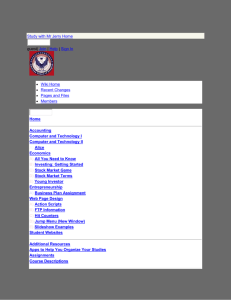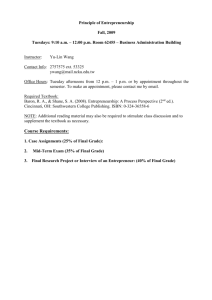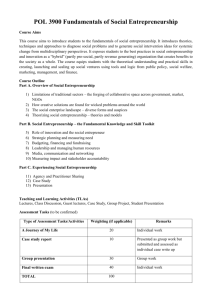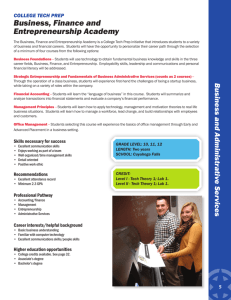Leaflet S1 SBM 2015
advertisement
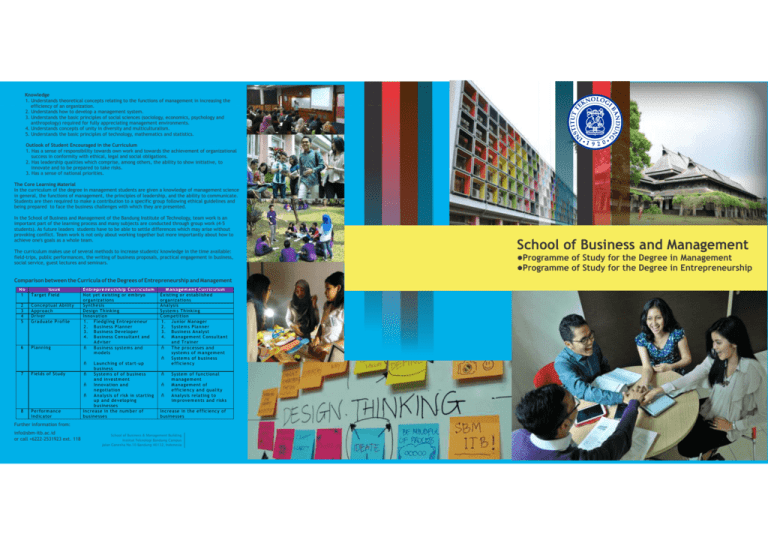
Knowledge 1. Understands theoretical concepts relating to the functions of management in increasing the efficiency of an organization. 2. Understands how to develop a management system. 3. Understands the basic principles of social sciences (sociology, economics, psychology and anthropology) required for fully appreciating management environments. 4. Understands concepts of unity in diversity and multiculturalism. 5. Understands the basic principles of technology, mathematics and statistics. Outlook of Student Encouraged in the Curriculum 1. Has a sense of responsibility towards own work and towards the achievement of organizational success in conformity with ethical, legal and social obligations. 2. Has leadership qualities which comprise, among others, the ability to show initiative, to innovate and to be prepared to take risks. 3. Has a sense of national priorities. Kegiatan Mahasiswa di Lab Kresna Sekuritas SBM ITB Kegiatan perkuliahan di Starbuck Coffee The Core Learning Material In the curriculum of the degree in management students are given a knowledge of management science in general, the functions of management, the principles of leadership, and the ability to communicate. Students are then required to make a contribution to a specific group following ethical guidelines and being prepared to face the business challenges with which they are presented. In the School of Business and Management of the Bandung Institute of Technology, team work is an important part of the learning process and many subjects are conducted through group work (4-5 students). As future leaders students have to be able to settle differences which may arise without provoking conflict. Team work is not only about working together but more importantly about how to achieve one's goals as a whole team. The curriculum makes use of several methods to increase students' knowledge in the time available: field-trips, public performances, the writing of business proposals, practical engagement in business, social service, guest lectures and seminars. Gedung SBM ITB Kegiatan mahasiswa School of Business and Management Programme of Study for the Degree in Management Programme of Study for the Degree in Entrepreneurship Comparison between the Curricula of the Degrees of Entrepreneurship and Management No 1 Issu e T arget Field 2 3 4 5 C onceptual A bility A pproach D river G raduate Profile 6 Planning 7 Fields of Study 8 Perform ance Indicator En tre p re n e u rsh ip C u rricu lu m N ot yet existing or em bryo organizations Synthesis D esign T hinking Innovation 1. Fledgling Entrepreneur 2. B usiness Planner 3. B usiness D eveloper 4. B usiness C onsultant and A dviser B usiness system s and m odels Launching of start-up business System s of of business and investm ent Innovation and negotiation A nalysis of risk in startin g up and developing businesses Increase in the num ber of businesses M an age m e n t C u rricu lu m Existing or established organizations A nalysis System s T hink ing C om petition 1. Junior M anager 2. System s Planner 3. B usiness A nalyst 4. M anagem ent C onsulta nt and T rainer T he processes and system s of m angem ent System s of business efficiency System of functional m anagem ent M anagem ent of efficiency and quality A nalysis relating to im provem ents and risks Increase in the efficiency of businesses Further information from: info@sbm-itb.ac.id or call +6222-2531923 ext. 118 School of Business & Management Building Institut Teknologi Bandung Campus Jalan Ganesha No.10 Bandung 40132, Indonesia SBMITB School of Business & Management Institut Teknologi Bandung Tutorial Field Trips Programme of Study for the Degree in Entrepreneurship School of Business and Management A comprehensive curriculum which includes studying, putting into practice and developing the science of the cycle of building a business enterprise, beginning with the identification of opportunities, devising creative concepts, planning the enterprise, and establishing it in its initial stages right up to the point of building upon innovative ideas having calculated the relevant risks. Bootcamp Management Practice “Oddisey” Service Scape Management Programme of Study for the Degree in Management School of Business and Management Knowledge 1. Understands concepts of innovation and principles of creativity in relation to the development of products and enterprises. 2. Understands how business develops. 3. Understands the basic principles of social sciences such as sociology, economics, psychology, anthropology and how they apply to understanding the institutions and context of the world of business. 4. Understands the principles of management science. 5. Knows the basic principles of technology, mathematics and statistics. Final Defence Preparation A comprehensive curriculum which includes studying, putting into practice and developing management science, the functions of business, the basic principles of leadership and the ability to communicate, as well as providing students with an understanding of business ethics and the ability to think analytically. Outlook of the Student Encouraged in the Curriculum Aim To produce Graduates in Entrepreneurship who are able to apply their skills and knowledge to recognize and grasp business opportunities, and create and develop enterprises after assessing the business risks involved. Graduates are expected to be able to plan business models and procedures which abide by ethical protocols in accordance with principles of business practice of universally acknowledged excellence and industrial standards of the highest quality. 1. Has high moral standards and recognizes responsibility in conforming to business ethics. 2. Has appropriate leadership qualities such as showing initiative, risk-taking, independence, creativity, being proactive and innovative. 3. Has a sense of national priorities when conducting business. The Core Learning Material Graduate Profile · Fledgling Entrepreneur · Business Planner · Business Developer · Business Consultant and Adviser Competences Skills 1. Able to plan business systems and models 2. Able to identify business opportunities and conduct research on the feasibility of a business and make a business proposal. 3. Able to see through a business from the stage of preparing the market, launching the product, managing production, human resources and finances. 4. Able to build up a business so that it develops with steady growth. 5. Able to manage risk associated with a business and its development. 6. Able to communicate and negotiate. Entrepreneurship is the disciplinary science of the life cycle of an enterprise beginning with conceptualization and planning right up to operating a successful business. The foundations of the science of entrepreneurship include business models, theories of innovation, business planning, handling of risk, investment and allocation of finances, a knowledge of negotiation and the business legislation, the setting up and development of a business. As distinct from management graduates who focus on increasing the efficiency of an established business system, graduates in entrepreneurship are interested in starting up a not-yet existing business or a business still at the embryo stage. The curriculum of a degree in entrepreneurship does not only consist of of understanding theoretical business models and business planning but also aims to produce graduates who are able to set up a new business and devise a strategy for the the growth of a business. The curriculum for the degree in entrepreneurship contains the unique feature of including the practical incubation of a business and constant guidance which helps students to gain planning and business experience so that the learning process does not only consist of studying theory but also includes directly having the experience of and operating a business. Aim To produce Graduates in Management who are able to conduct analyses and plan systems of management, and are highly skilled in using management concepts and frameworks together with technology to solve management problems in a business; who have leadership qualities and are able to make management decisions as well skilfully communicate effectively; and are able to be adaptive in the context of management problems which they might face. Graduate profile · Junior Manager · Systems Planner · Business Analyst · Management Consultant and Trainer Competence Skills 1. Able to carry out an analysis and plan the management system of a business. 2.Able to identify management problems and use management science frameworks and concepts to solve problems. 3.Able to operate a management system relating to the division of functions of a business. 4. Able to carry out an analysis, identify a system of optimization of resources, and take individual and collective decisions to increase organizational efficiency 5.Able to manage risks related to the taking of managerial decisions. 6.Able to communicate effectively and adapt to the context of business problems which may arise.




